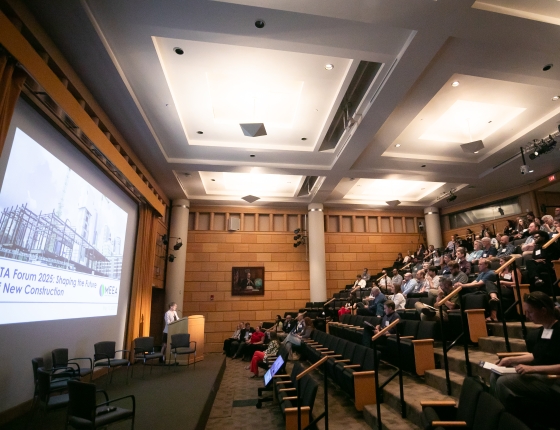On Tuesday, May 13, the staff of Minnesota’s Efficient Technology Accelerator (ETA)* hosted the first of what will be a regular forum convening experts, local stakeholders, and construction industry professionals on topics to advance energy efficiency in the state through promising technologies and research-backed policy goals. The 2025 ETA Forum: Shaping the Future of New Construction tackled the question of how to achieve Minnesota’s aggressive climate goals through energy codes on new construction in the state.
The forum speakers were arranged to zero-in on the scope of building energy codes, from their broader implications across the Midwest, to the specific current and future energy code plans in CEE’s home state of Minnesota, to how those energy codes come into practice in design and construction. The forum concluded with a panel featuring all the speakers, led by CEE’s Angela Peterson, touching on opportunities in advancing technologies, the financial realities of code adoption, and the importance of strong compliance. Panelists also reflected on how Minnesota’s leadership could influence energy practices beyond the state.
To kick things off, CEE’s Carl Nelson, the vice president of market energy solutions, provided an overview of ETA and underscored the importance energy code development to the process of market transformation.
"Codes are a core part of the market transformation strategy as they provide a baseline level of efficiency that can benefit all Minnesotans for the lifetime of these new builds."
Carl was followed by keynote speaker Alison Lindburg, the director of building codes and policy at Midwest Energy Efficiency Alliance (MEEA). As a regional energy efficiency organization, MEEA tracks energy code progression by state and county to show how adequate energy efficiency is the most cost-effective method for reducing energy consumption and emissions, leading to more resilient homes and buildings, lower energy bills, and greater comfort and safety.
Representing Minnesota’s agency perspective were Deputy Commissioner Kate Perushek and Building Official Greg Metz from the MN Department of Labor and Industry, as well as Anthony Fryer, the director of energy conservation and optimization at the MN Department of Commerce. The agency representatives explained that advancing building energy code policies is key to meeting the state’s ambitious climate goals. The Energy Conservation & Optimization program (ECO) has successfully proven in Minnesota that adequate research funding and its resulting findings generate the most pragmatic and impactful codes, while resources from local utilities boost code compliance across the board.
Finally, representatives from two Twin Cities based architecture firms, Elizabeth Turner from Precipitate and Leighton Deer from HGA, provided examples of single-family, multifamily, and commercial buildings that put advanced energy principles into practice to deliver substantial cost, comfort, and environmental benefits. While their work often exceeds current energy code requirements, it exemplifies how improving baseline requirements in Minnesota will bring more of these building benefits to all residents, business owners, and communities.
By assembling these experts in conversation, the event successfully conveyed the larger ecosystem that energy code policy emerges from and feeds into to effect greater and longer lasting change. CEE and the ETA program are grateful to the speakers and attendees for participating in what we hope to be the first of many opportunities to forge new connections in market transformation work and bring energy efficiency solutions to market faster and more impactfully.
Learn more about Minnesota's ETA and its initiative portfolio
*Minnesota's Efficient Technology Accelerator is a statewide market transformation program funded by investor-owned utilities, administered by the Minnesota Department of Commerce, Division of Energy Resources, and implemented by CEE.
